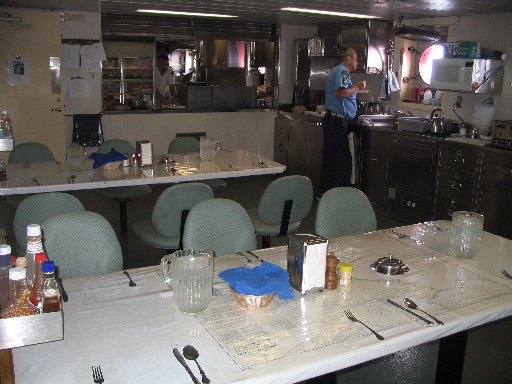( Log In ) Log In is for TREC Teachers & Researchers only
  |
| Betty_Carvellas |
 Jul 5 2006, 05:22 PM Jul 5 2006, 05:22 PM
Post
#1
|
 TEA Teacher    Group: TEA Teacher Posts: 41 Joined: 6-July 05 Member No.: 20 |
July 4, 2006
Until I typed the date, I had completely forgotten that today is the 4th of July, and everyone at home is enjoying a holiday, complete with parades, cookouts and fireworks. Sometimes it's tough to remember what day it is while out here since the routine is virtually the same from day to day. For now, we take samples twice a day, once after breakfast and once after dinner. Because we are taking them for someone else, we don't need to do much other than preserve and label them properly. Later, when our real work starts, we'll sample whenever we're on a station, and that could be any time of the day or night. Then it will get really tough to determine the day or the date! So - what is it like for a scientist (or for me who's working with a scientist) being on a Canadian Coast Guard icebreaker? The accommodations are quite comfortable, a shared room for most of us, with a small bathroom shared with the room next door. I sleep very soundly in my bunk because I love the rocking motion of the ship, and I'm behind my curtain that makes it a bit more private and blocks out the light that lasts most of the night. We have three incredible meals each day prepared by Harold Steed and Herb Lynch. The toughest part about meals is choosing among the great selections although neither Harold nor Herb minds if you try them all! Most of the scientists on board are on different schedules. Some sample during the day, some sample throughout the night, and others sample at set stations. When Jackie Grebmeier comes on board and we start our sampling, we'll be sampling at stations where she has sampled over a period of years. In most cases, sampling is only a part of the scientist's work. Samples must either be preserved, processed, logged, analyzed or any combination of the above. Ship time is expensive, and everyone wants to make the best use of their time on board.  Herb and Harold in the kitchen of the Laurier - Herb Lynch (left) and Harold Steed create three amazing meals each day plus snacks to keep us all going.  This is where the crew eats their meals and where we usually join them. The crew is extremely friendly and always helpful. They work hard, each person completing a 12 hour shift seven days a week. When anyone has spare time (crew or scientists) there's a small gym on board for those who want to workout, a daily bingo game with great prizes, and both a crew and an officer's lounge where people can relax or watch movies. Although the US Coast Guard is a part of the military, the Canadian Coast Guard is civilian, and this crew will be out for six weeks and then have six weeks off before coming out again.  Gym on board the Sir Wilfrid Laurier - The small gym on board is enough to provide a good workout. I try to get there once a day so I feel a little less guilty about eating so much wonderful food! Many at home in Vermont wonder why I do this especially because I leave Vermont during the most beautiful season of the year to come to the Arctic. This is my fourth trip to the Arctic working with Dr. Jackie Grebmeier. I know that the work is hard and I'll be exhausted by the time I fly home. But, I love standing on deck and seeing nothing but ocean all around, and I'm thrilled that I get to spend time with scientists who are studying an incredibly important part of the world. Their enthusiasm for their work is contagious. And, in order to write my journals, I get a chance to talk with all of them and observe their work. The ocean is an incredibly complex system, and it's fascinating to see how the various science disciplines work together to try to understand it.  This is what it looks like all around us. I really like the feeling that we are alone out here. Just as an added note. We are currently crossing the Gulf of Alaska on our way to a pass through the Aleutian Islands. For anyone who wants to check our position, we are currently (3:45 PM Pacific time) at latitude 52 degrees, 01 minutes, 401 seconds north and longitude 138 degrees, 47 minutes and 406 seconds west. |
| Lee_Cooper |
 Jul 6 2006, 07:23 PM Jul 6 2006, 07:23 PM
Post
#2
|
 Member   Group: TREC Team Posts: 17 Joined: 3-May 06 Member No.: 34 |
Hi Betty,
Jackie and I got into Dutch Harbor on the 4th and are at the Grand Aleutian awaiting your arrival. They have upgraded the wireless internet here since our visit in May (it seems to work more reliably) so we are keeping in touch and looking forward to getting on the ship. Keep up the great posts---I'm glad you made it out to Botany Beach at Port Renfrew. Lee Cooper |
  |
2 User(s) are reading this topic (2 Guests and 0 Anonymous Users)
0 Members:

|
NSF Acknowledgment & Disclaimer | Time is now: 2nd November 2024 - 03:26 AM |
Invision Power Board
v2.1.7 © 2024 IPS, Inc.








